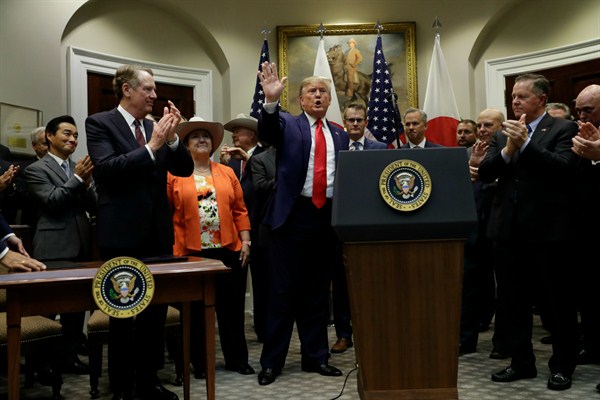Since his first day in office, President Donald Trump has made clear his general discomfort with multilateralism and particular dislike for the World Trade Organization. It was little surprise that he appointed Robert Lighthizer, a long-standing skeptic of the WTO and its legally binding dispute settlement system, as the U.S. trade representative. Over the past two years, as it has unilaterally imposed tariffs on trading partners and launched a major trade war with China, the Trump administration has taken steps to steadily weaken that system by blocking appointments to the body overseeing appeals. Now, the White House is reportedly threatening to bring the entire WTO to a halt by blocking its budget for the coming year.
At the core of this confrontation with the WTO is its process for settling trade disputes—what is known as its Dispute Settlement Understanding, which can authorize penalties against member countries that refuse to bring their policies into compliance with international trade rules. Under this mechanism, a WTO member can file a formal complaint against another member, alleging a violation of the rules. If the parties cannot resolve the dispute through consultations, they bring their case to a panel of experts. If one or both parties disagree with the panel’s ruling in that case, they can appeal the decision to the WTO’s Appellate Body; the WTO’s director-general will then assign three people from a standing roster of seven Appellate Body experts to review the case. If at least two of the three uphold some or all of the initial complaint, and if the two parties still cannot reach a negotiated solution, the complaining party can be authorized to seek compensation from or impose sanctions against the defendant.
The United States, particularly Congress, has never been comfortable with international legal regimes that might impinge on national sovereignty, so concerns about the Appellate Body’s role predate this administration. Under President Barack Obama, Washington’s representatives at the WTO’s headquarters in Geneva objected to particular roster nominees to signal their displeasure with certain Appellate Body rulings that had gone against the United States—particularly involving U.S. trade laws related to the imposition of duties on allegedly unfair imports. That weakened the dispute settlement process by threatening to politicize it and undermine its independence, but the Obama administration never tried to stop the system in its tracks.

